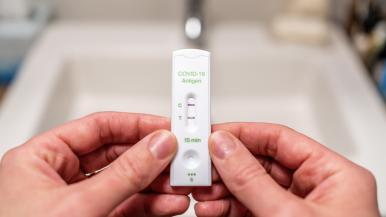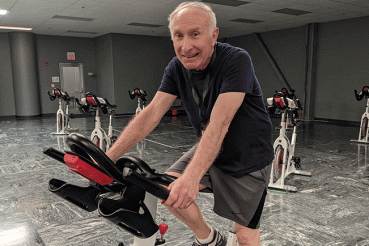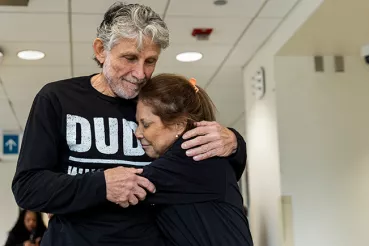Nancy thought her hypervigilance would keep her safe from COVID-19. Since the beginning of the pandemic, she has worn double masks in public, had most of her groceries delivered, kept social gatherings small and dutifully used her hand sanitizer. She is also fully vaccinated and boosted. “I did everything that we’re supposed to do to stay healthy,” she says. Yet last week, Nancy learned she had COVID-19.
“I thought I’d be the last person to catch COVID,” she says, her voice hoarse from coughing. “Initially, I didn’t take the news very well at all. I did everything right, and I just thought, man, I’ve been doing it for nothing.”
Understanding breakthrough infections
Most people who get COVID-19 are unvaccinated. But because no vaccine is 100% effective, some people like Nancy who are fully vaccinated and even boosted are still getting what are called “breakthrough” COVID-19 infections.
That doesn’t mean that the vaccines aren’t doing their main job: to keep people from getting seriously ill from COVID-19. According to the Centers for Disease Control and Prevention, fully vaccinated people who develop breakthrough infections are less likely to have serious symptoms compared with those who are unvaccinated. They are also much less likely to be hospitalized and die.
The unpredictable nature of COVID-19
Nancy, who is in her early 40s, takes care of her parents, who live with her in a southwestern suburb of Chicago. Both of her parents were vaccinated and scheduled to get boosted this week until they also developed COVID-19.
“I don’t know how in the world we got it,” she says. Nancy typically works from home, and when she does go to her workplace, she stays masked except for when she is alone in her office.
She and her parents spent Christmas with two siblings, but both tested negative. Nancy did have a few workers inside her house in recent weeks but everyone wore masks. After Christmas, she had to return some items to a store but wore two masks to reduce the risk of exposure.
Despite taking all of these precautions, Nancy wonders if she stopped being as diligent as she had been at the start of the pandemic. “I don’t know, maybe I was just a little too lenient,” she says.
Prior to getting infected, Nancy and her parents had at least one close call with COVID-19, which demonstrates how unpredictable the coronavirus can be. Back in November, they had lunch with a family member who tested positive for COVID-19 the next day — yet none of them developed the virus. “I really thought we were invincible at that point,” she says.
‘My throat felt like it was absolutely raw’
Although there have been reports that cases in the current surge fueled by omicron have generally been milder, Nancy’s COVID-19 symptoms have not been tame (it’s not clear whether she was infected with omicron or another variant like delta, although 95% of cases in the U.S. are now due to omicron).
“My throat felt like it was absolutely raw, or like it was severely burned, kind of like strep throat,” she says. “It was almost impossible to talk, it was so awful.” At first, Nancy thought her intensely sore throat was caused by her Crohn’s disease, which can sometimes cause inflammation in her esophagus. Unlike some people with Crohn’s, she does not take certain medications that can weaken the immune system. Otherwise, Nancy is in good health.
On the first day her symptoms appeared, Nancy called in sick to work and slept until noon. The next day, she became concerned that her symptoms weren’t related to her Crohn’s and started wearing a mask around her parents. By the third day, she went to Rush to get a PCR test. When the results came into her online health record at 4 a.m. confirming that she had COVID-19, she was already awake from the nagging coughing and sore throat. By then, she had also developed sinus congestion and a sense that her ears were “crackling.”
Her doctor at Rush recommended getting rest, drinking fluids and coming in if she developed any breathing issues. For several days after testing positive, Nancy had a fever that reached as high as 103 degrees. She barely had an appetite.
Within a day of Nancy’s symptoms appearing, her mom developed them as well. A few days later, her father also had symptoms. Although her father is in fairly good health, her mom has diabetes, which raises her risk for more severe COVID-19. But so far, both of her parents have been able to recover at home.
Advice for other cautious people
Now a week after testing positive, Nancy is feeling a bit better and focused on taking care of her parents while they recuperate. Although she initially felt defeated after her COVID-19 diagnosis, her feelings have shifted to a sense of gratitude. “Who knows where we would have been if we hadn’t gotten vaccinated and I hadn’t been boosted,” she says. “That may be the reason why we’re not in the hospital.”
As Nancy and her parents continue to recover from COVID-19, she offers this advice to others: “Don’t let your guard down.” Per CDC recommendations, that means wearing masks in public, practicing hand hygiene, keeping a safe distance from others and getting vaccinated and boosted if you are due. (If you had the Pfizer vaccines, you can now get a booster a month sooner, at least five months after your primary series.)
Nancy also cautions against thinking that you can’t get COVID-19 if you haven’t caught it yet. “You can’t underestimate the virus and how contagious it is,” she says.
Are you due for a COVID-19 vaccine or booster that can reduce your risk for severe COVID-19? Schedule your shot now.




